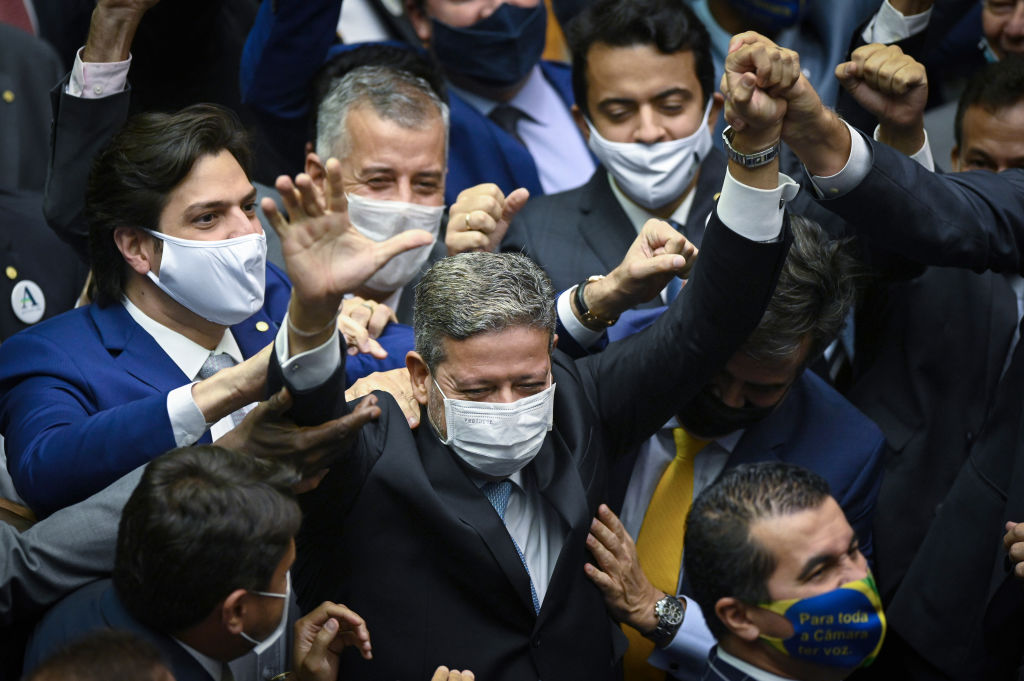Since populist Jair Bolsonaro won office, one of Brazil’s institutions has come to dominate the rest. No, it’s not the presidency—it’s Congress. In June, lawmakers obtained $910 million in discretionary funds from the “secret budget,” an opaque pool of government funds Bolsonaro exploits to buy legislative support and stave off the threat of impeachment. And that was just the latest move Brazil’s Congress made to grow its power.
Think that makes Brazil an outlier? Think again. Across Latin America, legislatures increasingly tend to hold the cards, while presidents find themselves on the back foot, forced to cut unsavory deals with lawmakers in order to survive. On the whole, the region’s democracies have begun to look and act like parliamentary systems, with legislatures wielding substantial power over the executive branch.
You could call it underground parliamentarism. And though it might seem like a healthy reboot for a region that was long a breeding ground for strongman presidents, the reality is more complicated. Done well, parliamentary systems have much to recommend them: They generate inclusive multi-party coalitions that can diminish polarization. They also allow lawmakers to reshuffle cabinets and replace executives as often as the public demands, opening a pressure valve sorely missing from presidential systems. No wonder political scientist Juan Linz, a longtime observer of Latin America, hoped for parliamentarism to catch on in the region.
Now, Linz’s wish has come true—but not the way he hoped. There are at least three ways Latin America’s presidential democracies increasingly look and act like a broken version of parliamentarism.
First, the institutional weakness of outsider presidents has given legislatures the upper hand. Over the past ten years, Latin American voters have increasingly opted for mavericks, like Peru’s Pedro Castillo, Guatemala’s Jimmy Morales and Chile’s Gabriel Boric, who have taken office without the backing of strong parties of their own. That sets presidents up with a tough choice: negotiate or face a hostile majority from day one.
It would be one thing if legislatures used their leverage for good, prompting presidents to govern in the common interest. But all too often, lawmakers have put their own professional and personal interests first. In Brazil, a hodgepodge of non-ideological parties has guaranteed a steady supply of government pork for itself by dangling threats of impeachment over Bolsonaro’s head. Similarly, when Iván Duque took office in Colombia in 2018 swearing to end mermelada, the practice of doling out discretionary funds to win legislative support, lawmakers from his coalition promptly joined the opposition—until he turned the tap back on.
Second, Latin America’s legislatures are now home to two common parliamentary phenomena: broad, multi-party alliances that cross ideological lines and tiny parties that routinely capture just a handful of seats. That might sound promising for a region that has long suffered from polarization and the exclusion of political minorities—but on the whole, the results have not been positive.
Recently in both Brazil and Guatemala, the left and right have come together—but not to finally address long-unresolved policy problems. Instead, lawmakers agreed to hinder pro-transparency legislation and reduce sentences for campaign finance corruption, respectively. In Peru, a proposal to limit prosecutors’ ability to strike plea deals—a key tool for advancing corruption investigations—made strange bedfellows of Keiko Fujimori’s Conservative Popular Force party, and the far-left Free Peru party earlier this year. Both parties include lawmakers under investigation.
The profusion of small new parties entering national legislatures has also made it a headache for presidents to build stable legislative coalitions. Peru’s Congress, elected in 2021, is home to no fewer than ten parties; Colombia’s, elected earlier this year, includes twelve. And that still puts both behind Brazil, where 16 parties hold at least one seat.
A third symptom of underground parliamentarism is the tendency of Latin America’s legislatures to impeach weak and unpopular presidents almost as readily as if they were cycling through prime ministers. The problem is that presidential impeachments tend to be dramatic and destabilizing events. In just the past decade, five Latin American presidents have been impeached or resigned to avoid impeachment, while two more have resigned under pressure from lawmakers.
And while some impeachments may have been legally justified—and virtually all were broadly popular—they have become awfully easy to pull off: in Brazil and Peru, legislatures took advantage of vaguely-worded laws to oust presidents with whom they had clashed. In March, Peru’s president Castillo narrowly survived his second impeachment vote in Congress in just eight months, and in June, Ecuador’s Guillermo Lasso avoided a similar motion by just twelve votes.
The rise of underground parliamentarism has not been all bad. Congresses have occasionally used their power over presidents to check reckless or unpopular behavior, such as when Brazil’s Congress launched an inquiry into the Bolsonaro government’s disastrous mismanagement of the COVID-19 pandemic response. But its effects are overwhelmingly negative: When and where legislatures obstruct presidents and eject them with abandon, instability will follow.
A difficult landscape for Latin American presidents
Though the strongman president remains a familiar figure in parts of the region, many presidents have faced fierce headwinds over the past decade. Tumbling commodity prices made for difficult conditions for incumbents—nowhere more dramatically than in Brazil, where Dilma Rousseff’s poll numbers crashed in parallel to markets, leaving her defenseless against impeachment. Citizens fed up with sky-high inequality and corruption took to the streets in record numbers, forcing presidents Otto Pérez Molina in Guatemala and Evo Morales in Bolivia to resign before the end of their terms and turning incumbents in Chile, Colombia, and Ecuador—Sebastián Piñera, Iván Duque, and Lenín Moreno, respectively—into lame ducks overnight.
Finally, corruption investigations ripped through established parties and soured electorates on candidates who knew the political system inside and out. For all their ideological differences, the outsiders-in-chief that voters opted for instead, like Peru’s Pedro Castillo or Chile’s Gabriel Boric, have shared one thing: they’ve struggled to govern.
Neither all-powerful legislatures nor overbearing presidents are ideal for democracy. But in countries where underground parliamentarism has become the norm, strengthening the president’s hand might not be the worst idea—if only to restore some balance.
Underground parliamentarism doesn’t bode well for publics’ trust in institutions. According to the 2021 Latinobarómetro survey, citizens across the region trust legislatures less on average than any other state institution. If legislatures continue to squander their power, they risk inviting a return to the past—in the form of a new generation of strongmen who promise to scrap broken institutions and clean up the mess. And if aspirants to power find willing allies in the military—as Bukele has in El Salvador, López Obrador has in Mexico or Jeanine Áñez did in Bolivia—that could prove the biggest threat of all.









